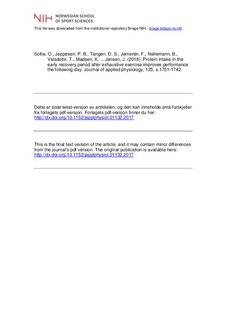| dc.contributor.author | Sollie, Ove | |
| dc.contributor.author | Jeppesen, Per Bendix | |
| dc.contributor.author | Tangen, Daniel S. | |
| dc.contributor.author | Jernerén, Fredrik | |
| dc.contributor.author | Nellemann, Birgitte | |
| dc.contributor.author | Valsdottir, Thorhildur | |
| dc.contributor.author | Madsen, Klavs | |
| dc.contributor.author | Turner, Cheryl | |
| dc.contributor.author | Refsum, Helga | |
| dc.contributor.author | Skålhegg, Bjørn Steen | |
| dc.contributor.author | Ivy, John L. | |
| dc.contributor.author | Jensen, Jørgen | |
| dc.date.accessioned | 2020-02-05T11:45:30Z | |
| dc.date.available | 2020-02-05T11:45:30Z | |
| dc.date.created | 2018-12-20T13:29:51Z | |
| dc.date.issued | 2018 | |
| dc.identifier.citation | Journal of Applied Physiology. 2018, 125, 1731-1742. | nb_NO |
| dc.identifier.issn | 8750-7587 | |
| dc.identifier.uri | http://hdl.handle.net/11250/2639791 | |
| dc.description | I Brage finner du siste tekst-versjon av artikkelen, og den kan inneholde ubetydelige forskjeller fra forlagets pdf-versjon. Forlagets pdf-versjon finner du på physiology.org / In Brage you'll find the final text version of the article, and it may contain insignificant differences from the journal's pdf version. The definitive version is available at physiology.org | nb_NO |
| dc.description.abstract | The aim of the present study was to investigate the effect of protein and carbohydrate ingestion during early recovery from exhaustive exercise on performance after 18-h recovery. Eight elite cyclists (V̇o2max: 74.0 ± 1.6 ml·kg−1·min−1) completed two exercise and diet interventions in a double-blinded, randomized, crossover design. Participants cycled first at 73% of V̇o2max (W73%) followed by 1-min intervals at 90% of V̇o2max until exhaustion. During the first 2 h of recovery, participants ingested either 1.2 g carbohydrate·kg−1·h−1 (CHO) or 0.8 g carbohydrate + 0.4 g protein·kg−1·h−1 (CHO + PROT). The diet during the remaining recovery period was similar for both interventions and adjusted to body weight. After an 18-h recovery, cycling performance was assessed with a 10-s sprint test, 30 min of cycling at W73%, and a cycling time trial (TT). The TT was 8.5% faster (41:53 ± 1:51 vs. 45:26 ± 1:32 min; P < 0.03) after CHO + PROT compared with CHO. Mean power output during the sprints was 3.7% higher in CHO + PROT compared with CHO (1,063 ± 54 vs. 1,026 ± 53 W; P = 0.01). Nitrogen balance in the recovery period was negative in CHO and neutral in CHO + PROT (−82.4 ± 11.5 vs. 7.0 ± 15.4 mg/kg; P < 0.01). In conclusion, TT and sprint performances were improved 18 h after exhaustive cycling by CHO + PROT supplementation during the first 2 h of recovery compared with isoenergetic CHO supplementation. Our results indicate that intake of carbohydrate plus protein after exhaustive endurance exercise more rapidly converts the body from a catabolic to an anabolic state than carbohydrate alone, thus speeding recovery and improving subsequent cycling performance. | nb_NO |
| dc.language.iso | eng | nb_NO |
| dc.subject | branched-chain amino acids | nb_NO |
| dc.subject | diet | nb_NO |
| dc.subject | glucose | nb_NO |
| dc.subject | nitrogen balance | nb_NO |
| dc.subject | sprint | nb_NO |
| dc.title | Protein intake in the early recovery period after exhaustive exercise improves performance the following day | nb_NO |
| dc.type | Journal article | nb_NO |
| dc.type | Peer reviewed | nb_NO |
| dc.description.version | publishedVersion | nb_NO |
| dc.source.pagenumber | 1731-1742 | nb_NO |
| dc.source.volume | 125 | nb_NO |
| dc.source.journal | Journal of Applied Physiology | nb_NO |
| dc.source.issue | 6 | nb_NO |
| dc.identifier.doi | 10.1152/japplphysiol.01132.2017 | |
| dc.identifier.cristin | 1646261 | |
| dc.description.localcode | Seksjon for fysisk prestasjonsevne / Department of Physical Performance | nb_NO |
| cristin.unitcode | 150,31,0,0 | |
| cristin.unitname | Seksjon for fysisk prestasjonsevne | |
| cristin.ispublished | true | |
| cristin.fulltext | original | |
| cristin.qualitycode | 1 | |
